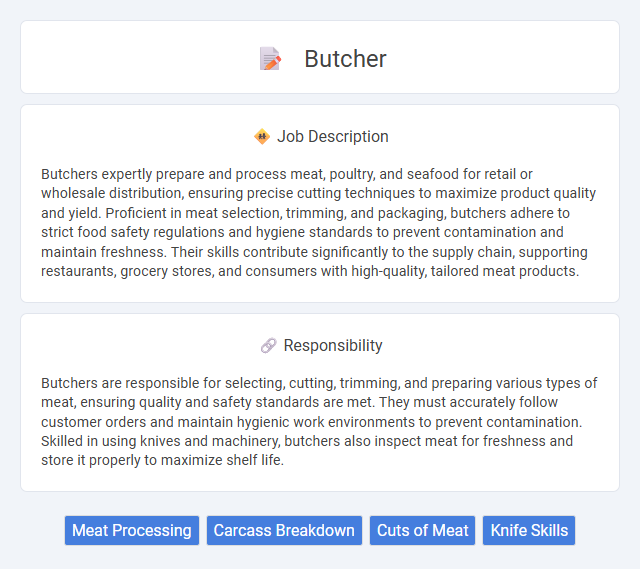
Butchers expertly prepare and process meat, poultry, and seafood for retail or wholesale distribution, ensuring precise cutting techniques to maximize product quality and yield. Proficient in meat selection, trimming, and packaging, butchers adhere to strict food safety regulations and hygiene standards to prevent contamination and maintain freshness. Their skills contribute significantly to the supply chain, supporting restaurants, grocery stores, and consumers with high-quality, tailored meat products.
People with strong physical stamina and good hand-eye coordination are likely suitable for a butcher job, as it involves repetitive cutting and lifting heavy meat. Candidates with a tolerance for working in cold environments and the ability to maintain attention to detail tend to perform better in this role. Those who suffer from chronic joint pain or have low pain tolerance may find the physical demands and working conditions challenging.
Qualification
A qualified butcher possesses extensive knowledge of meat cuts, safe handling practices, and knife skills essential for precise portioning and trimming. Certification in food safety and hygiene, such as ServSafe or HACCP training, is often required to ensure compliance with health regulations. Hands-on experience in meat processing and customer service enhances a butcher's ability to deliver quality products efficiently.
Responsibility
Butchers are responsible for selecting, cutting, trimming, and preparing various types of meat, ensuring quality and safety standards are met. They must accurately follow customer orders and maintain hygienic work environments to prevent contamination. Skilled in using knives and machinery, butchers also inspect meat for freshness and store it properly to maximize shelf life.
Benefit
Working as a butcher likely offers the benefit of stable income due to consistent demand for meat products in various markets. There is a probable advantage in skill development, as butchers gain expertise in meat cutting, processing, and safety standards, which can enhance employability. The role may also provide opportunities for entrepreneurship, such as opening a specialty meat shop, contributing to financial independence.
Challenge
The butcher job likely involves significant physical challenges due to heavy lifting and precise cutting requirements. Maintaining safety while handling sharp tools could be a frequent concern, increasing the demand for careful attention. Adapting to fast-paced environments may also present ongoing difficulties for individuals in this role.
Career Advancement
Butchers can advance their careers by gaining expertise in meat cutting techniques and pursuing certifications such as Certified Master Butcher credentials. Opportunities for career growth include supervisory roles, meat department management, or opening specialty butcher shops. Continuous skill development in meat processing, food safety, and customer service enhances prospects for higher salaries and long-term job stability.
Key Terms
Meat Processing
Butchers expertly handle meat processing by selecting, cutting, trimming, and preparing various animal carcasses to produce retail cuts and custom orders. They utilize specialized tools and equipment such as bandsaws, meat grinders, and knives to ensure precision, quality, and safety in meat portioning. Knowledge of meat grades, storage requirements, and hygiene standards is essential to maintain freshness and meet regulatory compliance in meat processing operations.
Carcass Breakdown
Carcass breakdown is a critical skill in the butcher profession, involving the precise cutting and sectioning of animal carcasses into primal and sub-primal cuts. Expertise in identifying muscle groups, fat distribution, and bone structure ensures efficient yield and high-quality meat products. Advanced knowledge of hygiene standards and cutting techniques maximizes product value while minimizing waste in meat processing.
Cuts of Meat
Expert butchers possess detailed knowledge of various cuts of meat, including primal cuts like chuck, rib, loin, and round for beef, and shoulder, loin, and leg for pork. Skilled in precision cutting and trimming, they ensure optimal meat quality, texture, and flavor for cooking purposes. Understanding the distinction between marbling, tenderness, and appropriate cooking methods allows butchers to provide high-quality cuts tailored to customer preferences.
Knife Skills
Mastering knife skills is essential for a butcher, ensuring precision in cutting, trimming, and portioning meats. Expert butchers utilize various specialized knives such as boning knives, cleavers, and carving knives to enhance efficiency and maintain meat quality. Proper knife handling reduces waste, improves safety, and produces consistent cuts, which directly impacts customer satisfaction and product value.
 kuljobs.com
kuljobs.com